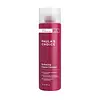What's inside
What's inside
 Key Ingredients
Key Ingredients

No key ingredients
 Benefits
Benefits

 Concerns
Concerns

 Ingredients Side-by-side
Ingredients Side-by-side

Water
Skin ConditioningHydrogenated Polydecene
EmollientDisodium Cocoamphodiacetate
CleansingGlycine Soja Oil
EmollientC12-15 Alkyl Benzoate
AntimicrobialPolysorbate 80
EmulsifyingLaureth-4
EmulsifyingAcrylates/C10-30 Alkyl Acrylate Crosspolymer
Emulsion StabilisingCocamidopropyl Betaine
CleansingChamomilla Recutita Flower Extract
MaskingBeta-Glucan
Skin ConditioningParaffinum Liquidum
EmollientPEG-7 Glyceryl Cocoate
EmulsifyingButylene Glycol
HumectantDisodium EDTA
Sodium Hydroxide
BufferingHexylene Glycol
EmulsifyingCaprylyl Glycol
EmollientEthylhexylglycerin
Skin ConditioningPhenoxyethanol
PreservativeChlorphenesin
AntimicrobialWater, Hydrogenated Polydecene, Disodium Cocoamphodiacetate, Glycine Soja Oil, C12-15 Alkyl Benzoate, Polysorbate 80, Laureth-4, Acrylates/C10-30 Alkyl Acrylate Crosspolymer, Cocamidopropyl Betaine, Chamomilla Recutita Flower Extract, Beta-Glucan, Paraffinum Liquidum, PEG-7 Glyceryl Cocoate, Butylene Glycol, Disodium EDTA, Sodium Hydroxide, Hexylene Glycol, Caprylyl Glycol, Ethylhexylglycerin, Phenoxyethanol, Chlorphenesin
 Reviews
Reviews

Ingredients Explained
These ingredients are found in both products.
Ingredients higher up in an ingredient list are typically present in a larger amount.
Caprylyl Glycol is a humectant and emollient, meaning it attracts and preserves moisture.
It is a common ingredient in many products, especially those designed to hydrate skin. The primary benefits are retaining moisture, skin softening, and promoting a healthy skin barrier.
Though Caprylyl Glycol is an alcohol derived from fatty acids, it is not the kind that can dry out skin.
This ingredient is also used as a preservative to extend the life of products. It has slight antimicrobial properties.
Learn more about Caprylyl GlycolChlorphenesin is a synthetic preservative. It helps protect a product against bacteria in order to extend shelf life. In most cases, Chlorphenesin is paired with other preservatives such as phenoxyethanol and caprylyl glycol.
Chlorphenesin is a biocide. This means it is able to help fight the microorganisms on our skin. It is also able to fight odor-releasing bacteria.
Chlorphenesin is soluble in both water and glycerin.
Studies show Chlorphenesin is easily absorbed by our skin. You should speak with a skincare professional if you have concerns about using Chlorphenesin.
Learn more about ChlorphenesinCocamidopropyl Betaine is a fatty acid created by mixing similar compounds in coconut oil and dimethylaminopropylamine, a compound with two amino groups.
This ingredient is a surfactant and cleanser. It helps gather the dirt, pollutants, and other impurities in your skin to be washed away. It also helps thicken a product and make the texture more creamy.
Being created from coconut oil means Cocamidopropyl Betaine is hydrating for the skin.
While Cocamidopropyl Betaine was believed to be an allergen, a study from 2012 disproved this. It found two compounds in unpure Cocamidopropyl Betaine to be the irritants: aminoamide and 3-dimethylaminopropylamine. High-grade and pure Cocamidopropyl Betaine did not induce allergic reactions during this study.
Learn more about Cocamidopropyl BetainePeg-7 Glyceryl Cocoate is created from polyethylene glycol and fatty acids from coconut oil.
It is a synthetic polymer with emulsifying and cleansing properties.
As an emulsifier, Peg-7 Glyceryl Cocoate prevents ingredients such as oils and water from separating. It also helps rinse away oils, dirt, and pollutants from skin.
Peg-7 Glyceryl Cocoate may not be fungal acne safe. It can also dry out skin.
Learn more about PEG-7 Glyceryl CocoatePhenoxyethanol is a preservative that has germicide, antimicrobial, and aromatic properties. Studies show that phenoxyethanol can prevent microbial growth. By itself, it has a scent that is similar to that of a rose.
It's often used in formulations along with Caprylyl Glycol to preserve the shelf life of products.
Water. It's the most common cosmetic ingredient of all. You'll usually see it at the top of ingredient lists, meaning that it makes up the largest part of the product.
So why is it so popular? Water most often acts as a solvent - this means that it helps dissolve other ingredients into the formulation.
You'll also recognize water as that liquid we all need to stay alive. If you see this, drink a glass of water. Stay hydrated!
Learn more about Water